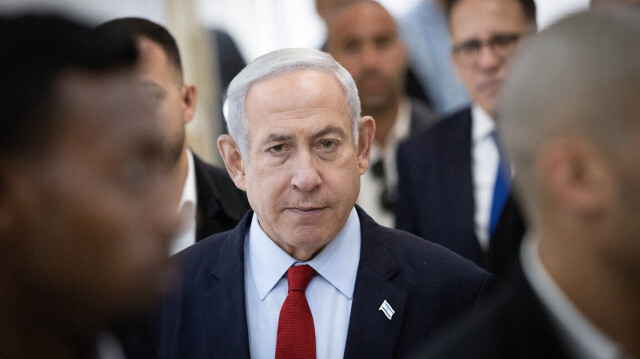

File photo
Netanyahu unsuccessful in censoring documentary of secret tapes of Israeli police interrogating him and other key witnesses during criminal probe on charges of corruption, fraud, and bribery
Israeli Prime Minister Benjamin Netanyahu was unsuccessful last week in censoring a documentary film revealing secret tapes of Israeli police interrogating him and other key witnesses during criminal investigations on charges of corruption, fraud, and bribery against him. Netanyahu was officially charged on Nov. 21, 2019 with fraud, breach of trust, and receiving bribes. He is accused of having a conflict of interest when he was communications minister in promoting the business interests of his friends in exchange for expensive gifts over a period of 20 years. He is also accused of criminal fraud for using his influence to promote legislation imposing restrictions on one media outlet and bringing significant financial benefits to its competitor in exchange for positive media coverage of him and his family. Due to the indictments, Netanyahu was legally required to relinquish his ministry portfolios, other than prime minister.
- Bibi Files exposes Netanyahu's corruption
Footage from police interrogations was leaked to Alex Gibney, an Oscar- and Emmy award-winning American documentary producer. He enlisted South African director and Emmy nominee Alexis Bloom to make a documentary titled The Bibi Files to expose his corruption internationally. Netanyahu's lawyers filed an injunction to prevent audiences at the Toronto International Film Festival from watching the film prior to its scheduled premiere screening last Monday. Netanyahu's lawyers made a request to the Israeli court before the same judges presiding over his corruption trial to block audiences in Canada from seeing the film at the festival. They argued the film was bound by Israeli privacy law, even though the law only applies to Israel, and that the publication of the police interrogations was illegal under Israeli law. Hours before the screening last Monday, Jerusalem District Court Judge Oded Shaham rejected the motion.
After the premiere of the film last Monday and a second screening on Tuesday, Gibney told audiences: "People are dying every day, and we wanted to make a statement with this film.” Whether or not the film will have an impact, either on Netanyahu's criminal trial or Israel's illegal aggression against Palestinians, remains to be seen.
However, in the film prominent Israeli figures, as well as former members of Netanyahu's staff and a longtime friend-turned-critic, all accuse Netanyahu of gross corruption and allege that he has failed to reach a cease-fire for his own personal interests. They also allege he has pursued highly controversial reforms of Israel's judiciary in order to evade justice himself. The longer the “war on Gaza” continues, the longer his own criminal prosecution will be delayed. Netanyahu has persistently sought to prevent his prosecution, by making a bid for immunity, and to delay his trial. The hearing of prosecution witnesses was expected to end in the first half of this year but last December the court agreed to reduce the number of hearings to two days a week due to “security concerns related to the ongoing Israel-Hamas war,” causing further delays and postponements.
- Netanyahu's forever war
The documentary also suggests Netanyahu has abandoned the release of hostages and prioritized continued attacks over any cease-fire. “A forever war is in his interest,” says one critic in the film. Those allegations appear to hold weight since cease-fire negotiations have dragged on fruitlessly for months while opinion polls and public protests demonstrate that the majority of Israelis favor the immediate release of hostages and a cease-fire. Palestinian group Hamas has consistently offered to release the hostages in return for an end to the war, the withdrawal of Israeli forces from Gaza, and the release of a large number of Palestinian prisoners. Yet Netanyahu has categorically rejected the U.S.-backed cease-fire proposal that Hamas agreed to in July. There is no doubt that the end of the “war” will lead to his expeditious prosecution on fraud, breach of trust, and accepting bribery, as well as a wider investigation into his government's failures on the hostage crisis. It could also lead to the Netanyahu government's collapse and early elections.
The secret recordings featured in the film have not been released and likely will never be seen in Israel. Israeli privacy law prevents the public release of the tapes and would place the unknown source at risk of prosecution. The Bibi Files does not have any distribution deals yet, but the documentary's producer and director are hoping the Toronto Festival screening will yield wider distribution and release. The fact that the film was screened in Canada, an Israeli ally, is not insignificant and is evidence of how public pressure is mounting and can overcome state censorship.
#Alexis Bloom
#Benjamin Netanyahu
#genocide of Palestinians
#Netanyahu's corruption trial
#Palestine
#The Bibi Files
